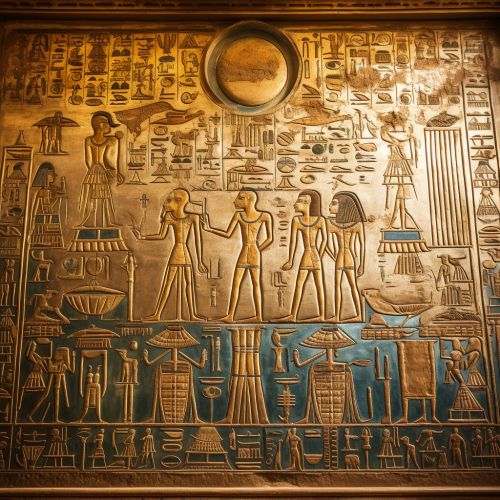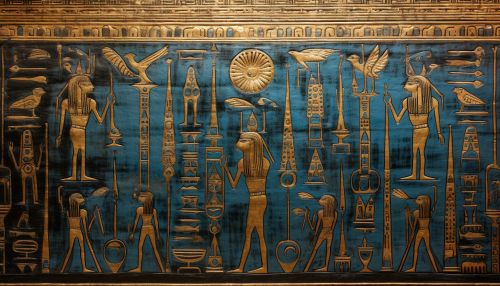Egyptian mythology
Introduction
Egyptian mythology is the collection of myths from ancient Egypt, which describe the actions of the Egyptian deities as a means of understanding the world around them. The beliefs that these myths express are an important part of ancient Egyptian religion. Myths appear frequently in Egyptian writings and art, particularly in short stories and in religious material such as hymns, ritual texts, funerary texts, and temple decoration.


Origins and Development
Egyptian mythology originated in the religious beliefs of ancient Egypt's civilization in the Nile Valley from at least as early as 4000 BC. The origins of these beliefs are not fully understood, but they formed the basis of the religion of ancient Egypt, which evolved into a highly complex system of rituals and ceremonies that helped to unite the people and maintain the divine kingship of the Pharaohs.
Deities
The deities of Egyptian mythology were complex beings, each with their own personalities, attributes, and domains of influence. The gods were not considered to be omnipotent or omniscient; instead, they were subject to the same needs, desires, and limitations as humans, but with powers that enabled them to influence the world in ways that humans could not. Some of the most important deities included Ra, the sun god; Isis, the goddess of magic and motherhood; Osiris, the god of the underworld and judge of the dead; and Horus, the sky god.
Myths and Legends
Egyptian mythology is rich in myths and legends. These stories served to explain the world around the ancient Egyptians, providing reasons for the natural phenomena they observed and giving them a framework for understanding the human condition. Some of the most well-known myths include the story of Isis and Osiris, the tale of the sun god Ra's daily journey across the sky, and the legend of the destruction of mankind.
Afterlife Beliefs
Belief in the afterlife was a fundamental aspect of Egyptian mythology. The ancient Egyptians believed that death was not the end of existence, but rather a transition to a different realm where they could continue to exist and interact with the gods. This belief was central to their funerary practices, which included mummification to preserve the body, the provision of grave goods for use in the afterlife, and the construction of elaborate tombs and monuments.
Influence on Other Cultures
Egyptian mythology has had a profound influence on other cultures, both ancient and modern. The Greeks and Romans, for example, adopted many Egyptian deities into their own pantheons, and many biblical stories have parallels in Egyptian myth. In more recent times, Egyptian mythology has inspired a vast body of literature and art, and continues to be a rich source of symbolism and allegory in contemporary culture.
